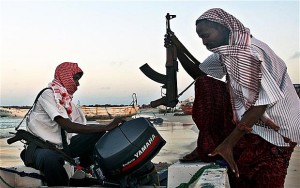
The hijacking of a tanker off Somalia’s coast shows the threat pirates still pose to one of the world’s busiest shipping lanes, a risk that may also hamper the Horn of African country’s efforts to explore for offshore oil and gas, a United Nations official said.
“This is absolutely a return of piracy,” Alan Cole, head of the UN’s Global Maritime Crime Programme, said of the March 13 hijacking of the Aris 13 tanker in waters off Somalia’s semi-autonomous Puntland region.
The tanker was the first commercial ship seized off the eastern African seaboard in five years. Hijackings in the region caused havoc for international shipping from about 2001 to 2012, peaking with 176 attacks in 2011. They declined in part because of actions by the European Union’s anti-piracy mission.
The Aris 13 was released by the assailants late Thursday, with the Puntland Maritime Police Force now in control of the vessel, Mohamed Jama Hersi, a PMPF officer, said by phone. He declined to comment on whether a ransom that the hijackers demanded had been paid.
Somalia, which chose a new president last month and is trying to emerge from decades of civil war and defeat al-Qaeda-linked militants, is seeking to encourage foreign companies to explore for oil and gas in its waters. Piracy represents a “setback” in the government’s efforts, Cole said in a phone interview from Nairobi, the capital of neighboring Kenya.
Somalia’s government is keen for companies such as Royal Dutch Shell Plc, Exxon Mobil Corp. and BP Plc to return and resume exploration for what it says are probable offshore hydrocarbon deposits. The state has held talks with those companies about reactivating dormant contracts.
IHS Inc the Englewood, Colorado-based risk adviser, in January 2016 said there was an increased risk from Somali pirates and that the majority of commercial shipping in the area no longer carried privately contracted armed security due to costs and perceptions there was no significant danger. Somalia’s government has also warned that illegal fishing by foreign vessels is threatening the livelihood of citizens, potentially leading some into piracy.
Somalia’s waters are remote and difficult to police, with no EU navy patrols in the area where the tanker was seized, according to Cole. The vessel may have traveled too close to shore and not fast enough, he said.
“Those parts of Somalia are still very dangerous,” Cole said. “Vessels need to take measures to protect themselves.”
Pirates are still “very much around” and, for them, “there is nothing else to do to make yourself rich other than criminal activities,” he said.